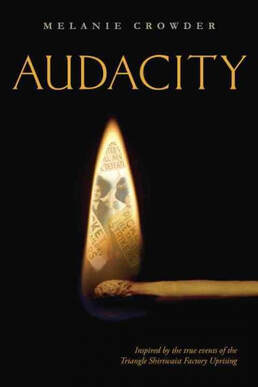
“…all I want/is to stretch my wings/to ride the fickle currents/beyond the reach of any cage.”
- Melanie Crowder, Audacity
Clara Lemlich has never been free. Not free to read the books she hides from her father and studies late into the night, gathering scraps of knowledge when no one is watching. Not free to live as a full citizen of the Russian Empire, instead forced to live in poverty in the Pale of Settlement, which Jewish people are restricted to at the turn of the twentieth century. Not free to dream of a life where she is not forbidden from the beauty of written words, and where she could save lives as a doctor.
When antisemitic violence forces her family to flee to America, the grueling journey brings them to New York City’s Lower East Side, a land of angular buildings and filthy tenements, and Clara is once again trapped by poverty and the duties of a good daughter, who must provide for her family as they struggle to survive. Where immigrant girls work quietly, meekly, in rows upon rows of factories, not protesting the exploitation they face because they know how easily they can be replaced, and because every penny counts. Where her dreams no longer seem quite so impossible.
Clara bristles at the injustices the other factory workers seem to take in stride, and soon becomes involved in the developing labor movement in the area–but she quickly learns that protesting will put her dreams of an education in jeopardy. Should she ignore injustice in favor of a hard-won opportunity for education? Or should she give up her beloved ambitions to fight for a cause that has already grown close to her heart?
I loved Audacity the first time I read it, and after a recent re-read, it remains one of my favorites. Its stunning, lyrical prose ranks it among one of the most beautifully written free-verse books I've read yet; while the writing is remarkably spare, the imagery and historical detail are evocative and absorbing. Clara’s courage, kindness, and unflagging determination make her immensely sympathetic, and it’s a joy to watch her develop over the course of the story, as the young girl who splinted birds’ wings and hid from anti-Jewish mobs becomes an infamous labor leader whose concern for her fellow workers and immigrants is matched only by her fiery determination for action–now. I also appreciated how Audacity thoughtfully explores the risks and sacrifices activists must make, as Clara struggles to balance her family’s needs, the injustices she longs to combat, and real danger to herself and her fellow factory workers if they step out of line.
I had never heard of Clara Lemlich, a real-life labor organizer, before reading this book, and I’ve since researched more about her–she’s a fascinating person, and I highly recommend learning more about her. (The historical notes and interviews with some of her family members at the end of the book are a great place to start!) While fictionalized, Audacity remains true to the essence of Clara’s work and early life. Eloquent and inspiring, I would highly recommend Audacity to readers ages eleven and up, especially for book groups or discussions.



 RSS Feed
RSS Feed
